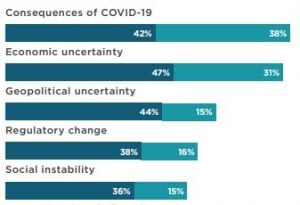What skills and capabilities are we looking for in our business leaders?
peru
There’s a lot going on in the world at the moment. We’re all trying to cope with change and uncertainty and many leaders are facing challenges they’ve never encountered before.
Our 2021 survey of 583 business leaders from 55 countries found that business leaders are concerned or are very concerned about a number of issues, from the consequences of Covid-19 to climate risks. Their top concerns are:

To navigate the uncertainty, today’s leaders need specific skills to keep their workforces strong. Skills like adaptability, empathy and problem-solving matter.
Alongside this, professionals are also thinking differently about what they want from their careers. We’re in the midst of what is being referred to as the Great Resignation, with workers quitting their jobs in record numbers. In markets around the globe, workers want to feel like they belong and fit in with their organisation and in their careers.
How our leaders behave during this time will affect the stability and growth of their organisations. So, what makes a good leader in the current climate? We see the following skills as crucial during these ever-changing times.
Empathy
The COVID-19 pandemic brought stress upon many workers. Employees may have lost loved ones or had to become caretakers for sick family members. Virtual school turned parents into classroom supervisors. An upended world changed how we shopped, saw each other and related to others.
The disruption has also emphasised the importance of authenticity in the workplace. According to Microsoft’s 2021 Work Trend Index survey, compared to a year ago, 39% of people say they’re more likely to be their full, authentic selves at work. What’s more, 17% of professionals have cried with a coworker in the past year.
We need leaders who can focus on the “human” side of leadership. A 2021 report by “Forbes” cited several research studies in which empathy was cited as an essential leadership skill that positively contributed to workforces.
Leaders today need to be understanding of what their employees are going through. They need to build relationships with their people and provide support that fosters work-life balance and that prioritises mental health for all.
Inclusivity
We also need inclusive leaders, who recognise the value of diversity and equity in the workplace. Inclusive leaders make everyone feel like they’re valued and like they belong. They treat all employees with respect and strive to inspire and instill confidence in their teams.
According to research from Deloitte, teams with inclusive leaders are 17% more likely to report they’re high-performing and are 29% more likely to say they behave collaboratively. Inclusive leadership also leads to teams being 20% more likely to say they make high-quality decisions.
Our own research found 93% of leaders agree it’s even more important in the current environment that employers ensure equal opportunities and support to all their people. Inclusive leaders develop open mindsets where they encourage contributions and innovation from everyone, no matter what their role or rank is.
Inclusive leaders are great listeners. They’re aware of how bias can affect a workplace and work to accept diverse points-of-view.
Adaptability
The past few years have taught us that anything can happen. Leaders must have an agile mindset and be able to adapt to changing industries and events.
Adaptability also requires an action-oriented approach. Technology is rapidly evolving, and leaders must possess “technological intelligence,” which goes beyond a mere understanding of how current technologies work. Technological intelligence requires being open to new technologies that can support business growth, creativity and innovation.
When business challenges emerge, adaptable leaders pivot to recover. A study of 300,000 leaders reported by “Inc.” found out of the 10 characteristics of successful leaders, problem-solving and issue analysis were prominent leadership skills.
Our research found 91% of leaders are confident they can steer their business in a new direction post-pandemic. Leaders look at problems as an opportunity to improve strategy, show resilience and come out better.
Commitment to people
Managers account for at least 70% of variance in employee engagement, Gallup reports, yet most employees aren’t engaged at work. You can greatly improve your business results when you invest in your team. According to the “Harvard Business Review,” employees who feel inspired are 125% more productive compared to workers who are just “satisfied.”
Great leaders:
- Meet with employees to talk about their career goals
- Create action plans to help team members grow their careers
- Provide learning and development opportunities to employees
- Encourage employees to take on new responsibilities and work outside their comfort zone
Effective leaders make a commitment to the development of their people and their talent. They know how much their team matters to their business’ success. They know that if they invest in their people, they will in turn give back more to the company.
Purpose driven
Great leaders unite a team behind a shared purpose, mission and vision. Leaders strive to continually create positive change. They’re willing to take risks that could result in better outcomes, all while remembering the business mission that drives decision-making.
As Gallup points out, a , including uniting fragmented teams. Leaders can communicate purpose by reinforcing:
- The company’s mission, values and goals
- How to measure success
- What a team’s strengths and areas of improvement are
- How to define effective collaboration
Leaders should exemplify the purpose and values behind their company. They motivate others to achieve specific goals and objectives. They’re willing to put in the work themselves and are great examples to those they lead.
Good leaders combine it all to drive business results
Leadership supports the people at your company and influences the quality of your product or service. Good leaders foster collaboration. They approach work from a people-centered viewpoint. They motivate, inspire and include all team members.
Whether you’re in a leadership position or aspire to be in one, rapidly changing times require adaptability, reflectiveness and cultural intelligence. Great leaders share in the same goals as their team. They support employees so that the entire workforce can achieve amazing business results for the organisation as a whole.
#togetherwemakeithappen






